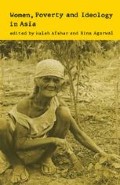Abstract
The stated ideology of domesticity that is part and parcel of the Islamic Government’s employment and social policies has direct and severely adverse effects on women, especially those who are too poor to afford the luxury of full-time domesticity. The current constitution nominates men as heads of household and responsible for the welfare of the family. Thus, by definition, women have become second-class citizens who must be morally protected by and financially dependent on men who are the designated providers and protectors. Those women who are not supported by a male breadwinner have become the lowest strata of second-class citizens. They have been defined as bisarparastan (the ‘unprotected’) by the constitution and are supposed to be dependent on the State. But despite its legal obligation to provide for this group, the Government has yet to make any provisions to do so. As a result the poorest and low-income women are of necessity obliged to fend for themselves and secure a livelihood for their family as best they can. But they do so in the context of a general condemnation of all women working outside the domestic sphere. The ‘unprotected’ carry the double burdens of poverty and ideological antagonism.
Access this chapter
Tax calculation will be finalised at checkout
Purchases are for personal use only
Preview
Unable to display preview. Download preview PDF.
Bibliography
Afshar, H. (1982) ‘Khomeini’s teachings and their implications for Iranian women’, in A. Tabari and N. Yeganeh (eds), In the Shadow of Islam (Zed Books).
Afshar, H. (1987) ‘Women, marriage & the state in Iran’, in H. Afshar (ed.) Women, State & Ideology (Macmillan), pp. 70–80.
Afshar, H. (1985a) ‘Muslim women and the burden of ideology’, Women Studies International Forum, vol. 7, no. 4, pp. 247–50.
Afshar, H. ‘The Iranian Theocracy’, in H. Afshar (ed.) (1985b) Iran: a Revolution in Turmoil (Macmillan), pp. 220–43.
Afshar, H. (ed.) (1985c) ‘The position of women in an Iranian village’, in Women, Work and Ideology (Tavistock), pp. 63–82.
Andishehayeh Rastakhiz Journal.
Donya, the political and theoretical publication of the central committee of the Tudeh Party.
Elson, D. and R. Pearson (1981) ‘The subordination of women and the internationalisation of factory production’, in K. Young et al. (eds) Of Marriage and the Market (CSE Books).
Etelaateh Banovan: weekly women’s magazine published in Tehran by Etelaat.
Iran Almanac
Jahaneh Zanan: women’s magazine published in Tehran.
Humphrey, John (1985) ‘Gender pay and skill: manual workers in Brazilian industry’, in H. Afshar (ed.) Women, Work & Ideology (Tavistock) pp. 214–31.
Humphrey, John (1987) Gender & Work in the Third World (Tavistock).
Najmabadi, A. (1987) ‘Women, State and Ideology in Contemporary Iran’, paper presented at the Workshop on ‘Women, Islam and the State’, Richmond College, London.
Tabari, A. (1982) ‘The enigma of veiled women’ in A. Tabari and N. Yeganeh (eds), In the Shadow of Islam (Zed Books).
Tabari, A. and N. Yeganeh (eds) (1982) In the Shadow of Islam (Zed Books).
Touba, R. (1972) ‘Relationship between urbanisation and the changing status of women in Iran, 1956–66’, Iranian Studies, vol. V, Winter, no. 1.
Zaneh Rouz: weekly women’s magazine published by Kayhan Publications in Tehran.
Editor information
Editors and Affiliations
Copyright information
© 1989 Haleh Afshar and Bina Agarwal
About this chapter
Cite this chapter
Afshar, H. (1989). Women in the Work and Poverty Trap in Iran. In: Afshar, H., Agarwal, B. (eds) Women, Poverty and Ideology in Asia. Palgrave Macmillan, London. https://doi.org/10.1007/978-1-349-20757-2_3
Download citation
DOI: https://doi.org/10.1007/978-1-349-20757-2_3
Publisher Name: Palgrave Macmillan, London
Print ISBN: 978-0-333-44409-2
Online ISBN: 978-1-349-20757-2
eBook Packages: Palgrave Social & Cultural Studies CollectionSocial Sciences (R0)

